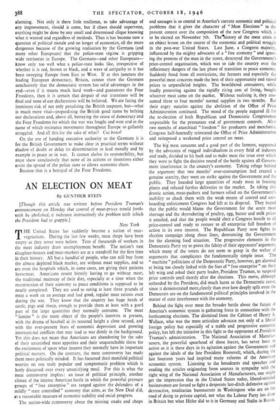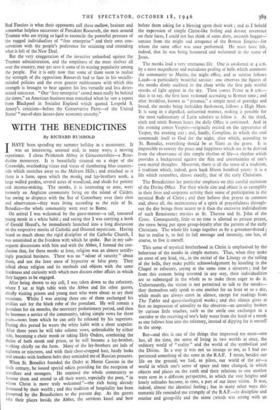AN ELECTION ON MEAT
By GUNTHER STEIN [Though this article was written before President Truman's announcement on Monday that control of meat-prices would forth- with be abolished, it indicates instructively the problem with which the President had to grapple.] New York
THE United States has suddenly become a nation of near- vegetarians. During the last few weeks, meat shops have been empty as they never were before. Tens of thousands of workers in the meat industry draw unemployment benefit. The nation's vast slaughter-houses and meat-markets are at a standstill for the first time
in their history. All but a handful of people, who can still buy from the almost depleted black market, are without meat supplies, and so are even the hospitals which, in some cases, are giving their patients horsemeat. Americans resent bitterly having to go without meat, the traditional mainstay of their diet, especially at a time when the reconversion of their economy to peace conditions is supposed to be nearly completed. They are used to eating at least three pounds of meat a week on an average and had good, regular meat rations even during the war. They know that the country has huge herds of cattle, pigs and sheep, enough to provide them at least with a good part of the large quantities they normally consume. The meat " famine " is the main object of the people's interests at present, with the drama of baseball at its seasonal height a close second, and with the ever-present fears of economic depression and growing international conflicts that may lead to war dimly in the background. Yet this does not mean that Americans are abandoning for the sake of their unsatisfied meat appetites and their unquenchable thirst for the excitement of sport what interest they normally have in important political matters. On the contrary, the meat controversy has made them more politically minded. It has focussed their manifold political worries on one truly popular and symptomatic problem which is hotly discussed over every unsatisfying meal. For this is what the meat controversy implies : an issue of political principle, another climax of the intense American battle in which the powerful pressure groups of " free enterprise " are ranged against the defenders of a mildly " state controlled " economy that aims, as the New Deal did, at a reasonable measure of economic stability and social progress.
The nation-wide controversy about the missing steaks and chops
and sausages is so central to America's current economic and political problems that it gives the character of " Meat Elections " to the present contest over the composition of the new Congress which is to be elected on November 7th. The history of the meat crisis is an object lesson on the course of the economic and political struggle in the post-war United States. Last June, a Congress majority, influenced by the mighty advocates of a " free economy " and ignor- ing the protests of the man in the street, destroyed the Government's price-control organisation, which was to tide the country over the inflationary dangers of the last phase of transition to peace economy. Suddenly freed from all restrictions, the farmers and especially the powerful meat concerns made the best of their opportunity and raised prices to unparalleled heights. The bewildered consumers, while loudly protesting against the rapidly rising cost of living, bought whatever meat came on the market. Without realising it, they con- sumed three to four months' normal supplies in two months. But their angry outcries against the abolition of the Office of Price Administration continued. The mood of the people augured ill for the re-election of both Republican and Democratic Congressmen responsible for the premature end of government controls. Aft-er two months of anarchical " freedom " for producers and merchants, Congress half-heartedly reinstated the Office of Price Administration and reimposed a weakened price control on meat.
• The big meat concerns and a good part of the farmers, supported by the advocates of rugged individualism in every field of industry and trade, decided to hit back and to make meat the issue over which they were to fight the decisive round of the battle against all Govern- ment interference in the country's economy. Taking refuge behind the argument that two months' over-consumption had created a genuine scarcity, they went on strike against the Government and the public. They hoarded large quantities of ready meat in freezing plants and refused further deliveries to the market. In taking this
drastic action, meat-packers and farmers relied on the. Government's inability to check them with the weak means of control and anti- hoarding enforcement Congress had left at its disposal. They hoped that the public would blame the Government for the acute meat shortage and the skyrocketing of poultry, egg, butter and milk prices it entailed, and that the people would elect a Congress hostile to all price-control and ready to restore to all enterprise full freedom of action in its own interest. The Republican Party now fights its election campaign along those lines, denouncing the Government for the alarming food situation. The progressive elements in the Democratic Party try to prove the falsity of their opponents' argument, which many of the voters do not seem to grasp in the welter of arguments that complicates the fundamentally simple issue. The " machine " politicians of the Derpocratic Party, however, got alarmed at being too closely linked with the foes of " free enterprise " on their left wing and asked their party leader, President Truman, to suspend price controls until shortly after the elections. This move, although unheeded by the President, did much harm to the Democratic cause, since it demonstrated moreclearly than ever how deeply split even the Democrats are on the fundamental political principles involved in the matter of state interference with the economy.
Behind the fight over meat the broader battle about the future of America's economic system is gathering force in connection with the forthcoming elections. The dismissal from the Cabinet of Henry A. Wallace, who was the most articulate advocate not only of a liberal foreign policy but especially of a stable and progressive economic policy, has left the initiative in this fight to the opponents oLPresident Truman's administration. The National Association of Manufac- turers, the powerful spearhead of these forces, has never been so active as it is these days in its agitation against the Government and against the ideals of the late President Roosevelt, which, during the last fourteen years had inspired many reforms of the American economic system. Listening to the broadcasts and speeches and reading the articles originating from sources in sympathy with the right wing of the National Association of Manufacturers, one might get the impression that in the United States today, liberal-minded businessmen are forced to fight a desperate last-ditch defensive against destructive, totalitarian bureaucrats in Washington who are on the road of doing to private capital, not what the Labour Party has done in Britain but what Hitler did to it in Germany and Stalin in Russia.
Red Fascists is what their opponents call these mellow, hesitant and somewhat helpless successors of President Roosevelt, the men around Truman who are trying so hard to reconcile the powerful pressure of the rugged individualists of " free enterprise " and their own con- servatism with the people's preference for retaining and extending what is left of the New Deal.
But the very exaggeration of the invective unleashed against the Truman administration, and the emptiness of the meat shelves all over the country, may yet save it some of its waning popularity among the people. For it is only now that some of them seem to realise the strength of the opposition Roosevelt had to face in his socially- minded policies and the even greater ruthlessness with which this strength is brought to bear against his less versatile and less deter- mined sutcessor. " Our ' free enterprise' crowd must really be behind the times," an American business man remarked when he saw a report from Blackpool in Socialist England which quoted Leopold S. Amery's criticism—before the Conservative Party—of the United States' "out-of-date laissez-faire economic anarchy."































 Previous page
Previous page